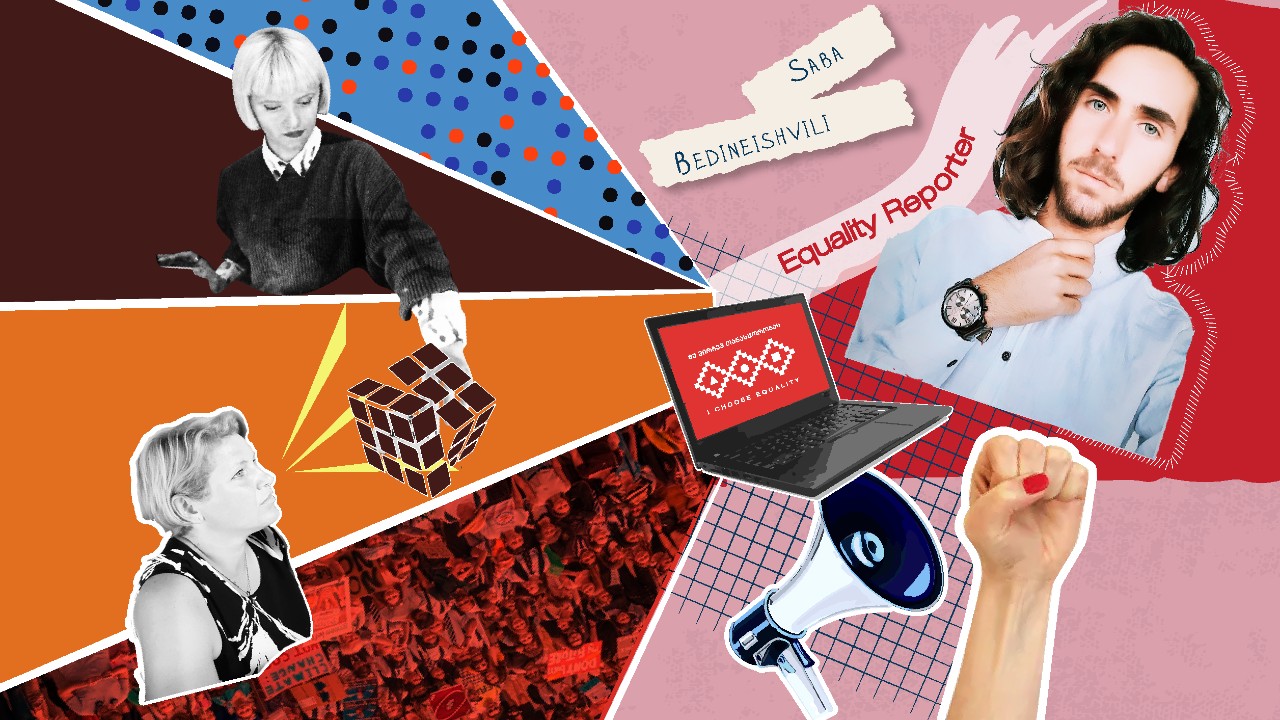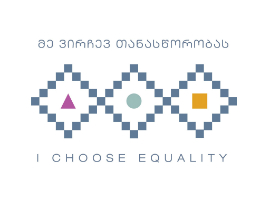All of us are a part of a society. We live in the environment that we create. One can assume that the environment tailored to us should be comfortable for us but in fact, this isn’t true! Why? The answer is simple. Part of the society is perpetuating stereotypical attitudes in Georgia, which label other representatives of the society according to their sex, interest or orientation. As a result, people lose what they value the most – freedom!
Unfortunately, discriminatory treatment against women is frequent in Georgia. Stereotypical attitudes portray women as a weak sex and dictate them what they can and cannot do. This limits women’s development because they can’t handle the pressure from the society. They try to convince themselves that they cannot do important things; instead, their only function is limited to household chores. Stories about two different women provided below will convince you that there is no weaker sex. Sex is only a relative notion and it has nothing to do with people’s skills and abilities.
Maria Tsulukidze – a teacher from Adjara. She teaches web-technologies in a community college New Wave. When she decided to learn web-technologies, women rarely choose this profession. They believed that it was inappropriate for women because they couldn’t learn technical subjects. Maria proved that a female web-specialist can be successful in this field. After overcoming all the obstacles, she decided to transfer her knowledge to other people, especially women. Maria believes that many women are interested in web-technologies, but they refrain from pursuing this career because of stereotypical public attitudes.
Maria made first steps in this area 8 years ago, when she created a project for training senior girls in web-technologies. Currently, Maria is a teacher and owing to her, nearly half of her students are girls.
Maria Tsulukidze recalls her childhood and the turning point in her life: „I was 4 years old when I decided to fix a radio. When I grew up and I had to choose my profession, I chose computer engineering. My family wasn’t happy with my decision because they thought that girls can’t be successful at this but I didn’t back down, my position was already very strong. Even though I didn’t have any suspicions about my decision, the turning point was the day I won a project. At the presentation of this project, I met two girls at the Philharmonic Hall – specialists of IT technologies. I was amazed because I thought IT specialists were boys with long beards and glasses. This fact finally convinced me that I was making the right choice. When I enter the auditorium and I see girls, I want to give them strength, hope and drive. My advice to everyone and to young girls in particular is to think carefully about what they want to study and what they want to do. If you do your job well, you will certainly leave a mark in the society.“
Similar to Maria Tsulukidze, a civic activist from Guria, Alyona Baskakova is trying to prove on a daily basis that women are different from stereotypical perceptions of the society. She is a mother of two children. She moved to a small village of Tskaltsminda in Guria from Tbilisi. According to her, she has always hated injustice since she was a child and she never turns a blind eye to it. In Tbilisi, she began addressing issues of public concern by working with local authorities to help people solve their problems.
Because of her fondness for rural areas, years ago Alyona decided to move to a village. She continued her civic work there. It was unusual for women to be so active, which is why locals didn’t take her seriously and often made sarcastic comments. Alyona recalls: „When I came to the village, I found a lot of problems. Many issues like gas and water supply and other infrastructural problems were not solved. At the same time, the village had a great tourism potential that remained untapped. In the beginning, when I started working on the problems, I decided to meet with locals, in order to find out what they thought and to solve these problems together. Some of them didn’t take this initiative seriously because it was coming from a woman. Despite many obstacles, I refused to give up and soon I was able to achieved results. When locals saw that my attempts brought results, they realized that women can do it, so others joined in. For years we’ve been working together and through our joint efforts we were able to increase and tap into the village potential. To tell you the truth, women are more active in this process, which makes me very happy. I want to tell each and every woman not to give up, no matter what. Don’t be a woman that ‘belongs in a kitchen’. Have a family, have a kitchen, but in addition to that, do something you love. We can do anything, nothing is impossible. It all depends on your efforts.“
These two women are actively fighting to achieve their goals, while helping others. As a society, we should understand that equality is an essential element of any democratic state. It serves as a prerequisite for welfare of people. It is impossible to achieve economic and political development without giving equal opportunity to everyone to get involved in the process of advancement of the country. Our life, our environment is in our hands. It is up to us to decide where and how we will live. Everyone should have their own lifestyle, goals and aspirations. No one has the right to tell you who to be and what to do. “The principle of equal rights reinforces human attitudes among different tribe elements. It creates trust and love, strengthens local and non-local fruitful influences and promotes a joint strive towards a shared cause. Repressive measures based on narrow racial characteristics can only lead us to a negative outcome” – these are the words of Iakob Gogebashvili. We should bravely say – We choose equality because we are ready to be free in a diverse environment!
The Equality Reporter competition was organised by the Council of Europe Office in Georgia together with the Government’s Administration of Georgia in the framework of the “I Choose Equality” campaign run by the co-operation project “Fight against Discrimination, Hate Crimes and Hate Speech in Georgia”. The project is implemented under the Council of Europe’s Action Plan for Georgia 2020-2023 with the support of the Danish Neighbourhood Programme in Georgia (DANEP).





